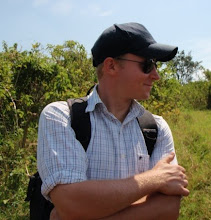Wednesday, December 22, 2010
Camp BE
http://campglowrwanda.wordpress.com/
Well, we just finished another Camp GLOW. Though I was not a facilitator for this year's Camp GLOW, I was chosen to be a councilor for Camp BE. Camp BE is just like Camp GLOW as far as curriculum is concerned, the only difference is that GLOW (Girls Leading Our World) is a girl's camp and Camp BE (Boys Excelling) is a boys camp.
I don't have any pictures to post yet and there is no 'Camp BE Rwanda' website to refer you to as of right now (this was PC Rwanda's first Camp BE), but all of this is coming soon. However, like I said, both camps were pretty similar and the same subject matter was taught last year. I encourage you to take a look at the website I have posted above if you are interested in learning more about what happens at these week-long events.
Merry Christmas and Happy New Year!
Tuesday, December 14, 2010
Third Year Service Gets the Green Light
 (Pictured here: Rwanda. West Province is in pink. Rusizi is the part of the West Province in red.)
(Pictured here: Rwanda. West Province is in pink. Rusizi is the part of the West Province in red.)Notification:
"Hi Emmett and congrats! You have been officially selected to be the PCVL [Peace Corps Volunteer Leader] in Rusizi [West Province, Rwanda]." - APCD Peace Corps Rwanda.
Message dated Monday, December 13th 2010 7:58am.
Some Notes:
Rusizi is a district (akarere) in Western Province, Rwanda. Its capital is Cyangugu, the major city of the Rwandan south-west and the district contains large parts of the former Cyangugu Province. The district lies at the southern end of Lake Kivu, where it empties into the Rusizi River (after which the district is named). Rusizi's capital, Cyangugu, is one of the three major Rwandan lake ports of Lake Kivu (along with Kibuye and Gisenyi) and it contiguous with the much larger Congolese city of Bukavu. The district also contains the western half of Nyungwe Forest, a popular tourist destination, being one of the last remaining forest areas of Rwanda and home to chimpanzees and many other species of primate.
Friday, December 3, 2010
Friday, November 19, 2010
Climbing Mt. Bisoke


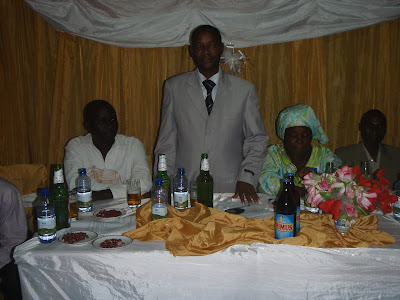
I felt bad for our porters, guide, and escorts. Each time we stopped for a small break, we (the westerners) took something out of our bags to snack on or drink. I could tell that we seemed like a bunch of huge fatties to them - eating and/or drinking something every 20 minutes. I could tell they just wanted to keep going. We offered them food and drink, but they took it in a way that insinuated that they weren't really hungry or thirsty at all; they just took the gift to be nice. They also hardly broke a sweat, which made me feel that much more out of shape because I was huffing and puffing all the way up that damn trail. Man, I gotta quit smokin'.
*
Friday, November 12, 2010
What I have been doing the last two years: An excerpt from my third year application
Describe the most important things you accomplished during your two years of service.
Providing Americans with a better understanding of Rwanda is an accomplishment of which I am most proud. I have a blog (www.reebinrwanda.blogspot.com) and I update it with pictures, personal experiences, and current Rwandan news; I also post pictures on Facebook and I even started the unofficial Peace Corps Rwanda Facebook Group, which provides information about Rwanda and Peace Corps to new/potential volunteers and to family and friends of current volunteers. These electronic forums allow friends, family, and other interested parties to connect with me in a private interface where they can ask questions and acquire information.
Furthermore, I have a WWS contact (Lincoln Township High School); I have regular communication with Club Interact, a volunteering and community service club that is sponsored by the high school. I am also in contact with a special education school where my friend's mother is a teacher. In addition to communicating with students from these two institutions, I frequently write letters to my family, my friends, and my church community describing my experiences.
All of these groups have told to me that I have played a large role in helping them not only understand Rwanda better, but Peace Corps as well. Many of these groups, in turn, have provided me with support, both financially and morally, to be successful in Rubona, Rwamagana my current site of Peace Corps service.
Providing Rwandans a better understanding of Americans has been a successful objective for my secondary projects. After the first three months in Rubona, I created a pen-pal exchange between neighborhood children in Rubona and the schools with which I am partnered in America. I also have a pen-pal exchange for my adult English class; these pen-pal relationships are between my adult Rwandan students and my adult family friends in Chicago. Fostering these relationships has given my neighbors in Rubona a better understanding of my family, my friends, and the culture of America.
The adult English class I teach four nights a week from 6pm to 7pm also provides me with a venue to discuss American culture with my neighbors. Together we study health topics in English; these topics have included personal hygiene, how to recognize and avoid risk behavior, and the nature of the human body. Every other English lesson, however, is about American history or culture. These lessons may highlight a state or city or they may be about a particularly notable American, such as Martin Luther King, Jr. When the lesson is about one of these topics, we discuss why this person, city, or invention is important to American culture and history.
As a result of creating pen-pal relationships between neighbors and friends and sharing information about America in the classroom, my integration into the community of Rubona has been easy and enjoyable. Through respect, effective communication, and presence at site, I have received an excellent reputation among community members.
I not only enjoy a high level of integration within the community of Rubona, I am also well integrated into the Peace Corps Volunteer (PCV) community. I participate in events with fellow volunteers and I have built positive and mutually beneficial friendships and professional relationships with my peers.
I attribute my successes to both village community integration and PCV peer community integration to being reliable, responsible, reasonable, and having a positive attitude; I also overcome fears and apprehensions very easily, which allows me to be more open to new experiences, conversations, and points of view.
Just as sharing American culture with my community has helped me integrate, integrating into my community has helped me perform my primary assignments successfully. I am a trusted member of Rubona’s community and my ability to mobilize and motivate neighbors and health center staff is a direct benefit of this achievement.
As a community, we conduct personal hygiene and work place cleanliness trainings and tutorials. Working with the health center staff members on these projects, specifically, has given them a strong sense of empowerment and accomplishment. The nurses and staff of the health center, in turn, are serving their patients with more efficiency and with greater pride in their work. As a result, a higher level of patient care is being practiced, which is giving the health center more credibility among the community members it serves.
My Days Are Numbered
About 20 more weeks until I take that big plane home.
If you are sending packages, please DO NOT send them to me after January 2011.
Still waiting to here about my third year application.
Will keep you posted when I know more.
Monday, October 18, 2010
Personal Hygiene

Earlier this month was 'International Teachers Day' and my village had a ceremony for all of the teachers. It was great; we ate, we drank, then we went home.
As I was walking home, I received a text from Madison, another PCV. We texted back and forth until I reached my house. I sent another text to her as I was walking to my outhouse. Well, it is dark in my outhouse and I frequently activate my phone's flashlight ability and balance the phone on my door in order to 'do my business' with some light.
Just as I set my phone on the door and was about ready to...um...uh...you know. Madison texted me. My phone (which was on vibrate because of the ceremony) buzzed once, fell off of the door frame, hit the floor, bounced, then went right into the outhouse hole. Nothin' but net.
I got a new phone and a new number the next day.
In other news, 'Phase 2' of the water project in Rubona is officially finished. I just had a meeting with Jenny, the PCV in Rwamagana city who has been helping me with the grants, and we are starting 'Phase 3' this week. 'Phase 3' will concetrate on getting sinks and the appropriate plumbing installed in the men's and women's hospitalization wards. (These wards, like much of the health center, currently have only buckets of water available for nurses and patients to use.) The grant is pretty much finished, we just need to send it in and wait for the confirmation of approval.
In related news, I received a generous donation of soap, shirts, and shoes from Agahozo-Shalom Youth Village. In an effort to keep this blog short, I won't go into great detail regarding the village, BUT I will encourage you to check out the website:
http://www.asyv.org/home.html
Because they gave me 100 bars of soap, I figured the best day to distribute these materials would be on October 15, also known as 'International Hand Washing Day.' So, I invited some PCVs and some ASYV volunteers to help me give tutorials about hand washing at my house on that day. I also invited students from the adult English class that I teach during the week nights to come and translate for us.
Everything went great. Lilly, a volunteer from ASYV, and Tom, a fellow PCV, joined me on Friday to give the tutorials. I had recruited about 15 other volunteers from the village to help us out, most of them being my students from the adult English class. Together we taught almost 100 people: how to wash their hands; when to wash their hands; what to use to wash their hands; and why to wash their hands. Villagers that completed the lesson successfully received their choice of a shirt or shoes. The event last only three hours, but it served almost 100 people; if I had more shirts and shoes to give out, it could have easliy lasted another three hours and served another 100 people.
That is all for now. Peace.
Saturday, September 25, 2010
Language Lessons Lead to Love
 (Pictured Here: Verene [wearing the red blouse] and Callixte [wearing the grey suit and the red tie] at the Nzigiye Sector Office on their wedding day.)
(Pictured Here: Verene [wearing the red blouse] and Callixte [wearing the grey suit and the red tie] at the Nzigiye Sector Office on their wedding day.)Yesterday I attended the civil wedding of Callixte and Verene. The ceremony took place at the sector office in Nzigiye, a neighboring sector of Rubona (the sector where I live and work).
Civil weddings are pretty tame; at least, the ones I have attended are pretty low key. They generally take place at a sector office where the head of the sector conducts the marriage ceremony, which usually includes from two to eight couples. Each couple takes turns making the marriage official through the state of Rwanda - the public officials presiding over the group ceremony take the couples' finger prints and have the couples sign some legal documents and swear some oaths.
Civil ceremonies are generally attended by local family members and friends. This doesn't sound like it would be a lot of people, but because up to eight couples can get married at once, the room at the sector office can fill up quickly. These ceremonies, though modern in nature, are traditional in the sense that the civil wedding itself takes place in the sector where the wife's family lives. There is also a reception held afterwards; depending on the family's economic means the reception could be at a hotel or at the home of the wife's family. If the reception is held at the later location, you will probably find more traditional food and drink - these are the best receptions, I feel.
The dowry and the church ceremony usually come after the civil wedding, though not necessarily right away. I have been a part of some ceremonies where the civil marriage happened on a Saturday and the next day was the dowry and church wedding. However, I also know some couples that have had their civil wedding months ago and are still saving up money, and vacation days from work, in order to properly celebrate at a church. The order of these events really all depends on each couple's economic situation and work schedules.
I may have explained a lot of stuff about civil weddings in an earlier blog entry, but I am too lazy to sort through them to check. At any rate, I wouldn't normally even write about a ceremony that, though very important, is so bland. However, this particular civil wedding had a very interesting back story. Well, interesting to me, at least, because Callixte and Verene are both students in the adult English language course I teach on weekday evenings.
Verene is a bio-technician in the lab at the health center I work at and has been a great friend of mine since the day I arrived in Rubona; she has been registered in my class since it began. Callixte is a neighbor who has also been a student of mine for almost two years now. I am pretty sure they knew each other before the class began, but I was told that they really didn't get to know each other more personally until they started studying together. Apparently, they have been 'cultivating the love' (dating) for a while now and have decided to take the next step and get married.
I am not taking credit as a matchmaker or anything. I just think its cool that my English class played the role that it did in their love story.
Verene and Callixte, I wish you many years of wedded bliss. May God bless you both.
Thursday, September 16, 2010
Friday, September 10, 2010
'Phase 1' and 'Phase 2'
Thank you for your hard work, Jenny!
Before I had left for Malawi, Jenny (a PCV in Rwamagana city) and I began working on getting running water in the Birthing Room, the Lab, and in the main Consultation Office of the health center in my village. Jenny had done the leg work of completing the grant and getting the money and I was 'overseeing construction' - which means I was to make sure that the construction work actually got done at the site.
Before I had left on my trip, the construction was well on its way; when I returned, it was all finished. The nurses are so happy with the results that they have asked Jenny and I to find more money to get running water to the Operation Room and the Maternity Ward. I helped Jenny with the grant application for this 'Phase 2' project and now she and I are waiting for the answer, which should arrive any day now.
If/Once Jenny and I get the money, we'll be able to get 'Phase 2' construction started and begin getting money for 'Phase 3.' I would like 'Phase 3' to focus on getting running water to the two other Consultation Offices on the other side of the health center grounds, the Bathrooms, and the two Hospitalization Wards. I may have to split 'Phase 3' into three parts, which means the Consultation Rooms would be 'Phase 3,' the Bathrooms would be 'Phase 4,' and the Hospitalization Wards would be 'Phase 5'...or something like that...
...sorry, now I am just typing my stream of consciousness.
Anyway, keep your fingers crossed for us!
Friday, August 27, 2010
The one when Emmett goes to Malawi



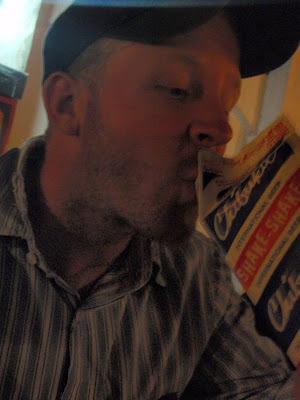


Pictured Here: (From Top to Bottom)
* Nora hangs out at 'Big Blue Star Backpackers,' the lodge we stayed at in Nkhata Bay, Malawi.
Friday, July 30, 2010
Malawi, Kickball, and Construction

The vacation request was just approved! Going next week! Malawi, here we come!
On another note, the kickball tournament last weekend was fun. It was very well organized and it was great to see PCVs from the different training groups.
Construction has begun at my health center; they should have running water in the lab, the maternity ward, and one of the counseling rooms by the end of August!
Brandon has let me borrow his harmonica and its 'How to Play' book. We'll see if I can make more of a contribution to the band besides singing.
I still haven't received my photos and video of the white water rafting trip on the Nile River. Once I do, you'll know.
More to come soon!
Thursday, July 22, 2010
Uganda

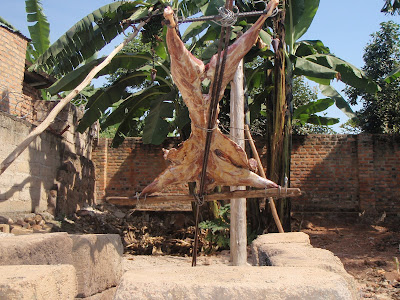
Sunday, June 13, 2010
Yolanda's Visit
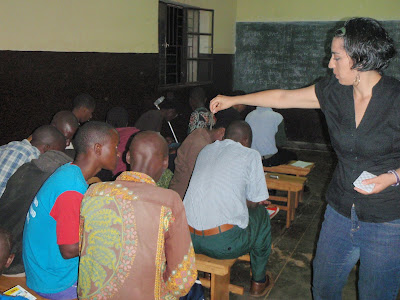




These past few weeks have been pretty busy. It is time for an update, my friends.
Yolanda came to visit me in Rwanda from 05/28/2010 - 06/12/2010. Before I begin telling you what we did, I want to thank everyone that made this trip possible for her. Thank you to the friends and family members that encouraged her to visit. Thank you to the people who gave money to Yolanda to help my community. Thank you to my fellow Peace Corps volunteers who helped me to welcome Yols and show her a good time. Thank you to the people of Rwanda, especially those in my village, that opened their country to us. And, of course, thank God for our safe travels, clean water, and delicious food. God, thank you for putting Yolanda in my life; she is a great friend and has blessed every life she has touched.
Yolanda's visit.
Yols arrived on the night of 05/28/2010 at Kigali International Airport. We took a taxi from the airport to a restaurant called 'Heaven' to have a beer and to grab a bite to eat. 'Heaven' is a pretty expensive tourist place, but I encouraged her to enjoy it while we were there. Once we got to my village, we would be in a whole different world.
We met up with Malcolm in Kigali the next day, then traveled to Rwamagana city and stayed the night with Brandon. The day after that (Saturday), we all went to the park and made camp. Camping, as always, was a blast. One friend in particular, Miles, really made the evening a memorable one...hilarious guy. Hilarious.
I didn't think that going on a safari the next day, right after camping, would be the best idea. After camping (and drinking - let's be honest here) you're tired, you smell, maybe your back hurts from sleeping on the ground, and so on; all you want the next morning is a shower and a cup of coffee. You do NOT want to get up at dawn to travel a bumpy road to see animals. I tried it before in January and I just remember falling asleep in between animal sightings. I had fun, but I missed the view.
After camping, we packed up our gear and Yols and I made our way to my village. Monday, Tuesday, and Wednesday of that week consisted of touring the village, visiting some neighbors, and giving her a sense of what life is like for me and the community. Yolanda was great about everything; she even helped out at the health center AND she taught Spanish to my adult English class in the evenings.
Everyone that met Yolanda loved her. The only problem she and I had in my village during the trip was explaining to my neighbors and co-workers that Yols and I were NOT married, nor were we dating. They just couldn't understand why a woman would travel so far to visit a male friend. I figured we would run into this kind of confusion.
In Rwandan culture, men and women visit eachother, but they generally don't stay over night if they are not family. If a man does stay the night at a woman's house (or vise-versa) and they are not related, it is implied that their relationship is sexual. Before her visit I even explained to my students and the staff of the health center that Yols was a friend...ONLY a friend. They said they understood, but when they met her they began to bombard us with questions regarding 'our relationship'.
Some people even thought we were married and that our marriage contract was for only two weeks; many Rwandans think that Americans sign marriage contracts for various amounts of time - 2 weeks, 6 months, 5 years, and so on. When the contract is up, the two people split up and marry other people. (We have our incredibly high divorse rate in America to thank for this little piece of misinformation.) It was bearable the first week, but people just kept pushing it and I was getting a bit frustrated with the questions and comments towards the end of the second week.
Moving on.
Before Yols came, she asked that we accomplish three things while she was visiting; she said that if she was able to do these three things, she would consider the trip to be a success. These activities included seeing a market (we finished that one right away), going on a safari, and attending a wedding.
Like I said before, going on safari is difficult if you were partying the night before. So, I decided that on Friday, the 4th of June we would rent a car, get up super early, and go on a big game safari in Akagera. We did it and it was awesome. We couldn't get close to the giraffes like I did before, but we got some great photos of zebras and hippos.
Oh yeah, I have a side note for you all. So the last time I went on safari I listed all the animals I saw (I am not going to do that here because I pretty much saw the same animlas), and there was some confusion about the type of giraffe I saw. Well, I got the answer for you. The giraffes in Akagera are Maasai Giraffes. These giraffes are actually not native to the area; they were brought in from Kenya.
Yeah, Yols and I had a VERY knowledgable park ranger accompany us on our tour; he was full of bits of infromation about the park and its animals. The most exciting pieces of information (to me, at least) was that the park is planning on introducing Black Rhinos to the area AND the park rangers want to start giving night tours so people have a better chance at seeing the predators.
Anyway, after the safari, we returned to my village and began making preparations for the wedding the next day. The wedding was for Emmanuel and Nikuze; Emmanuel is an accountant at the health center that I work at. I invited a bunch of Peace Corps volunteers and friends from other organizations to come out to my village that day, see the wedding, and hang out; I got a couple of takers.
The wedding was to begin at the local Catholic church at 2pm, or so said the invitation. Yols and I went to the church at 2pm that Saturday afternoon (06/05/10) and no one was there. I totally should have figured that we would be on 'Africa Time', which means the wedding wouldn't begin for another 3 hours. So we returned home to wait. During those next couple of hours Malcolm, Brandon, Chrissi, and Kate showed up; an hour after them Miya and her friend arrived.
We had a couple of beers at the bar that Rutambi's dad runs/owns and spent some time catching up and hanging out. Well, it started getting late and I heard from some of my neighbors that the wedding was over but the reception was still in swing at the groom's house. Jean-Marie was in town and he was happy to walk our group to Emmanuel's home. The reception was fun and when it was finished JMV walked us home and we all made dinner - a delicious stew of everything we could find!
On a side note, JMV told me that he has a new job in Kigali. I forget the name of the organization, but they are flying him out to South Carolina for a week of training. He is VERY excited.
The next morning we woke up to the sound of hundreds of people in front of my house. We all went to my front gate to see what the deal was. We soon learned from Rutambi that a Rally Race was taking place this weekend. Racecars were flying down the the dirt street through the main part of town and turning left on the street towards Rwamagana city - so pretty much right in front of my house! We stood out there for a couple of hours and watched the cars go past; we got showered with dust.
After the race died out, we had lunch, and said goodbye to our guests. Yols and I then began to clean the house from top to bottom. Everything was covered in dust!
The following few days Yolanda and I helped out at the health center during the day and taught Spanish in the evenings. Yolanda was a great teacher. She taught them numbers, greetings, and the 'La Loteria' game, which is kind of like the Mexican equivalent of 'BINGO'. The game is a great learning tool because there are pictures that explain what the words mean. We gave out notebooks, pens, pencils, and crayons to the winners. We had a bunch of stuff left over at the end of the class, so we just gave the rest of the items out to the teams that didn't win. The class enjoyed it very much.
On Wednesday she said goodbye to my village and we traveled to the West Province to visit Kate at her site near Nyungwe National Park. We spent a day and a half walking through tea fields and the jungle. We didn't see any animals, but we did get an awesome tour of a tea factory from Kate's host mom. We also made 'umugali', a traditional bread made from casava, for dinner with a delicious meat sauce. It was pretty awesome for our first time making it.
On Friday (this past Friday), we got on a VERY crowded, very hot bus and headed North from Gisakura, Kate's site, to visit Mark at his site. Mark's birthday was last week and he invited us to go to Lake Kivu for his birthday. Kate, Yols, and I took him up on his offer and went to see him and the lake. We met up with a bunch of Peace Corps volunteers at Kibuye, had some beers, and watched Mexico and France tie their opponents in the World Cup.
The next day (yesterday) we got up early, went to Kigali, finished packing everything up, and said our goodbyes at the airport.
All-in-all, I think the trip went well. We got to do everything on Yolanda's wishlist and we didn't have any sicknesses or unpleasant events. Yolanda did get all chewed up by mosquitoes, though (yeah, sorry 'bout that, Yols), and there was a time or two we thought we were going to drive right off the side of a cliff when traveling from Kate's site to Kibuye...but we lived.
Yeah, it was great. I tried to write down everything I could remember, but I am sure I missed something somewhere. I will probably be updating this entry as I remember events and such. Yols, help me out here. What am I missing?

